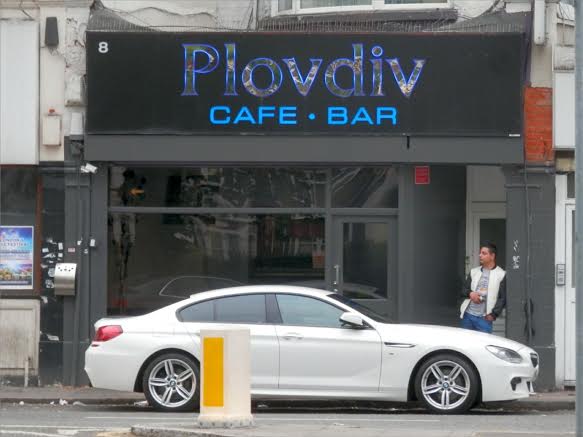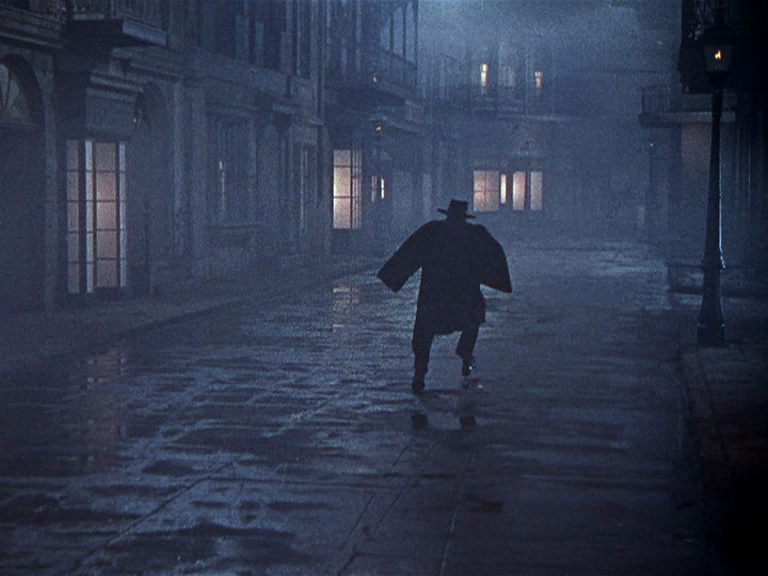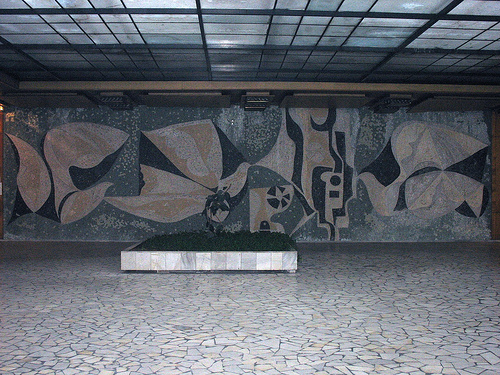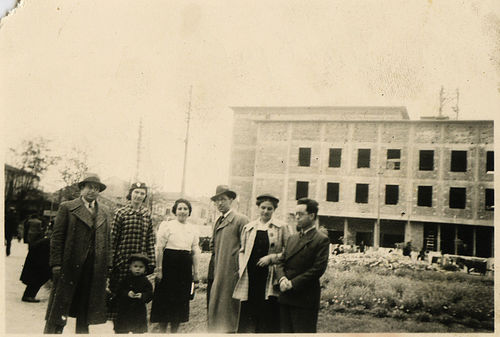I have received a number of letters asking me to give some account of Old Farmer Frack. It is true that he was a mad old man, probably due to ergot poisoning. But he could be surprisingly lucid, too. For a time he employed a professional voice coach, more used to working with thespians, to help him develop exciting new roars and bellows. His cows were much given to bellowing, and Old Farmer Frack wanted to be able to bellow back in a way they would understand.
The voice coach was Satnav Gobgag, scion of the Bulgarian aeroplane manufacturing dynasty, whose huge hangars on the outskirts of Plovdiv were the site of tremendous aeronautical innovation during the interwar years. Satnav was a great disappointment to his parents and grandparents and great-grandparents, for despite receiving a first class education in the kinds of things that would make anyone fit to head an aeroplane-building business, he turned his back on the family firm and devoted himself to the questionable career – questionable in Bulgaria at that time, anyway – of drilling drama-struck misters and misses in the art of projecting their voices, be they dulcet or stentorian. It has been said that no one took to the stage of the Plovdiv Theatricum in the middle years of the last century who had not learned their stuff from Satnav Gobgag.
Exiled after the war to the country where Old Farmer Frack herded his tubercular cows, and by now grey and stooped and often covered in crumbs and dust, Satnav Gobgag fetched up at a ruined hotel on the seafront at Cack. He was only thirty-four, but looked to be twice that age, such had been his privations. It is well worth avoiding such privations if one can, but Satnav did not have the benefit of hindsight. Cut off without a penny by the Gobgag clan, accompanied in his exile by his pet coot, Satnav was on the point of starvation when into his hotel one day wandered Old Farmer Frack.
Q – What was the mad old man doing there, so far away from his cows?
A – He was in Cack to collect bags of sand, and stopped in at the hotel for a greasy breakfast, for he was fond of greasy breakfasts, but back at the farm usually made do with a dish of cowfeed.
Q – For what purpose did Old Farmer Frack need bags of sand from the beach at Cack?
A – To forestall, or avert, the flooding of his barns.
The pair struck up a conversation in the breakfast room of the hotel. And of what did they speak, this ill-matched duo? Why, they chattered away about the single topic that was convulsing the citizenry of Cack in those dark days, namely the invasion of an army of killer moorhens which was sweeping through the town in wave after wave of destructive mayhem. Satnav’s poor coot was cooped up in his hotel room for its own protection, and the penniless voice coach was frantic with fear what would happen to it when, as must surely soon happen, he and his coot were tossed out on their ears for non-payment. He reckoned without the lackadaisical approach of the hotel manager, Grimes, who affected a foppish disregard for such niceties as money. So long as his chef cooked up a greasy breakfast, and there were petunias in the plant pots, Grimes was happy to lean against the wall in the lobby flicking ash onto the tiles from the Norwegian cigars he had specially flown in. By coincidence, his smokes arrived once a month on an aircraft of Gobgag manufacture.
Old Farmer Frack was temperamentally blind to any animals except his cows, so his brain was perplexed by this talk of moorhens. He kept trying to change the subject, without success. After a while, he sat back in a daze, hypnotised by his companion’s mellifluous fluting, high-pitched jabbering, booming ostinato, silky whispers, and impeccable diction, for Satnav was deploying all of his vocal talents in describing the terrible sight of a thousand murderous moorhens tramping relentlessly towards the shopping arcade. It was when he made a noise like a cow that Old Farmer Frack sprang out of his seat, grabbed him roughly by the collar, and demanded that he repeat his bovine bellowing. Shortly thereafter, a deal was struck between the two men. Satnav Gobgag fetched his coot, and his paltry luggage, from his room, and accompanied Old Farmer Frack aboard his cart as they trundled off along meandering lanes to the farm.
Within days, the mad old fool was having rewarding conversations with his cows. He bellowed at them and they bellowed back. As he herded them from field to field, purposelessly, through all hours of the day and night, his voice coach reclined on a rickety sofa improving his English with a thorough reading of Dobson pamphlets while his coot plashed happily in Farmer Frack’s pond.
The idyll could not last. One autumnal day, when fallen leaves from the pugton trees so clogged the pond that the coot stayed indoors, there came a hammering at the door. Old Farmer Frack was miles away, in the furthest of his fields, though a faint bellowing could be heard when the wind died down. The coot, still nerve-wracked from its sight, through the hotel window, of lethal moorhens, trembled. Satnav Gobgag dropped his pamphlet – I think it was Dobson’s Some Remarks On The Grotesque Pallor I Encountered This Morning In My Shaving Mirror (out of print) – and strode in his brave Bulgarian way to the door. Opening it, he was astonished to find Grimes, the hotelier of Cack, florid with rage and somehow deeply threatening in a windcheater the colour of custard and a stout pair of wellington boots. All foppishness gone, Grimes had come to demand money. So much money, in fact, that Satnav pictured himself doing the washing up in the unsavoury hotel kitchen for the next forty years.
Q – Had something happened to Grimes to make him suddenly mindful of the unpaid bills of his hotel guests?
A – Yes. He received a clonk on the head from a piece of falling masonry.
Q – Had he tracked down other past guests, or did he have some sort of vendetta against Satnav Gobgag?
A – The former. Grimes now spent his days on horseback, criss-crossing the land demanding money with menaces from those who had taken advantage of his formerly lax manner.
Q – What menaces did he threaten?
A – Menaces so heinous they are unsuitable for family reading.
Q – What happened next?
A – Satnav Gobgag did the washing up in the unsavoury hotel kitchen for the next forty years. His coot remained on the farm, where he visited it every other weekend until it perished. Old Farmer Frack, having learned as much bovine bellowing as he needed, continued to be mad, and bellowing, and his cows bellowed back at him, for ever and ever, Amen.





